
This page contains information and recorded sessions from our afternoon concurrent sessions. Scroll down to read more about the speakers and the case studies and research they presented.
At the bottom of the page you will also find pre-recorded presentations and research summaries from contributors who did not speak live on the day.

Rachel is Kaihautū Rangahau | Chief Researcher for the New Zealand Council for Educational Research (NZCER). She constantly strives to develop her own, and other people's thinking about education, why it matters, and how our learning and teaching systems may need to change to match the opportunities and demands of a changing world.
Rachel is currently leading a research project to explore systemic educational responses to climate change. As Keynote Speaker for our afternoon session, Rachel looked at opportunities, challenges and hope in our learning spaces in Aotearoa New Zealand.
Read more about Rachel's work here.

Beyond a Siloed Approach to Gardening: Models for Integration in Schools
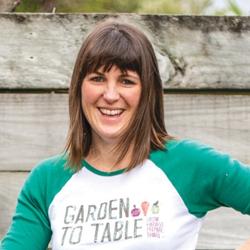
Victoria shares examples from Primary and Intermediate schools, where teachers and students have integrated learning about gardening across a range of learning areas. Covering Pollinator Pathways, composting, soil investigations and more, this session will break down barriers and inspire cross-curricular learning across the school.
Victoria works for Garden To Table and is a passionate and experienced educator, skilled in creating unique and fun educational resources for children. With experience in team leadership and the not-for-profit sector, she is passionate about helping kids reach their full potential through improving access to healthy food, reconnecting to nature, learning life skills and awakening their curiosity through hands-on exploration during the school day.

Research: Benefits and Integration of Nature-based Education in our School System
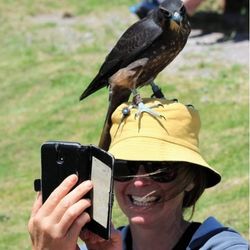
Thea is a PhD candidate at the University of Waikato, with a strong research interest in the national network of environmental education organisations and their role in supporting teachers. A key component of her study has explored the learning approach of nature-based education in the Aotearoa New Zealand context. Thea comes with over 15 years of experience as an environmental educator and has been a key player in the development of education programmes and initiatives, such as ‘Taupō for Tomorrow’, ‘Kids Greening Taupō’ and the ‘Taupō Environmental Education Collaborative’. In 2015, research for her master’s degree resulted in the emergence of the ‘Collaborative Community Education Model’, a framework underpinning a number of emerging programmes and projects around the country.

In her presentation, Thea shares some of her findings as to why nature-based education is so significant in today’s age and many feasible ways of integrating this approach across all curriculum learning areas and levels of our education system.
Read more about Thea and her research in this Education Gazette article.
Teaching in Nature: Bush Kindy Case Study

Join Celia for a photo and video tour of her Bush Kindy. She will share the importance of nature connection for strengthening environmental awareness, some of the practical logistics of teaching outdoors all day and how you can manage safety. You will come away with a clearer idea of the vital role of nature play in any environmental programme in helping develop a long-lasting love of nature.
Celia is the founder of Little Kiwis Nature Play and is a nature education specialist, consultant, speaker and parenting coach. She is passionate about connecting children to nature and is a strong advocate for nature play, risky play and improving mental health and well-being through nature. Celia is chair of Nature Education Aotearoa, co-chair of Education Outdoors New Zealand and is an advisor for ECE Reform.
The recording of Celia's presentation is not available for viewing at this time, but you can find more information about her courses and work on her website here.
Environmental Science and Local Curriculum through Student Led Action
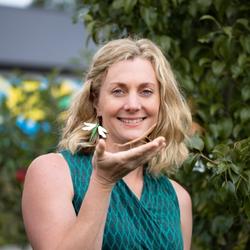
Burnside Primary School kaiako Bianca won the 2021 Prime Minister's Science Teacher Prize for her teaching which celebrates a “hands on” approach, including real-world learning with a local curriculum focus. This provides all students with opportunities to shine and to develop a wide range of skills. Bianca will share examples of how she engages students with nature and local curriculum, both within their school grounds and in the wider community.
One example is the student-led B5 project. Students created a special habitat at the school and reintroduced the endemic Boulder Copper Butterfly which have thrived at the school and they are now working with other schools in the region to translocate the butterflies, so those schools can become satellite sites.

Read more about Bianca and Burnside Primary in this Education Gazette article and this Stuff article.
Climate Change Education and Wellbeing: With Understanding Comes Resilience

Sian Carvell is a registered primary teacher with over 20 years’ experience in the education sector. Since 2018, she has been developing and teaching the climate change learning programme ‘Huringa āhuarangi: Whakareri mai kia haumaru āpōpō I Climate Change: Prepare today, live well tomorrow’. Using feedback from ākonga and teachers from Ōtautahi schools as well as educators and climate change science experts, she recently coordinated an audit of the programme in partnership with the Ministry of Education.
Jenny Ritchie, of Te Herenga Waka Victoria University of Wellington, teaches and researches in the areas of: social, cultural, and ecological justice; pedagogies that support children’s cultural, spiritual, and emotional wellbeing and citizenship enactment; and applying Māori conceptualisations in sustainability pedagogies. She recently led a team of colleagues (Sandy Morrison, Mere Skerrett and Ali Glasgow) in the writing of ‘Te Tai Unuora’, the wellbeing guide that accompanies ‘Huringa āhuarangi: Whakareri mai kia haumaru āpōpō'.

Having taught the programme extensively, Sian and Jenny share the philosophy behind the resources, along with inspirational examples of how teachers applied the programme and ākonga used their ‘climate wise’ to develop the confidence and courage to participate and take informed action. Student Keegan Verster joins Sian and Jenny to share his experiences and passion for empowering young people to take part in meaningful action.
Read more in this Education Gazette article and watch this inspirational video, We Asked to Be Heard.
Find out more about Sian's work on her Future Curious website.
Research: Climate Change Education, Student Agency and Hope
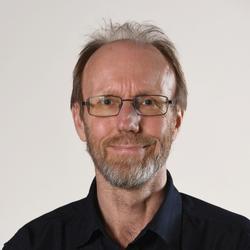
Chris Eames and Sally Birdsall worked with two high schools to examine how taking a specific approach to climate change education can influence student understanding, hope and agency. In this session they will outline their research approach and some key findings.
Associate Professor Chris Eames is in Te Kura Toi Tangata, School of Education at the University of Waikato. He teaches environmental and sustainability education (ESE) to pre-service education students and conducts research with postgraduate students and colleagues into many areas of ESE, including most recently climate change education. He is currently also helping to revise the Achievement Standards for ESE for senior secondary schools.

Sally Birdsall teaches science and sustainability education courses in undergraduate and postgraduate teacher education programmes at Waipapa Taumata Rau, the University of Auckland. Her research focuses on ways in which teachers and students learn about contentious issues, come to appreciate differing viewpoints, develop emotional resilience, and take informed action both individually and collectively. Sally’s current research is in contexts of declining biodiversity and the climate emergency.

With students Harriette Jolly and Lottie Blake Manson
Integrated, Student-led Learning and Collaborative Teaching
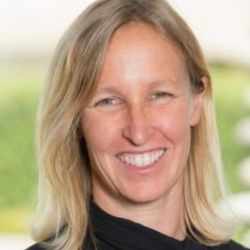
Kate has been teaching at Rangi Ruru Girls School in Ōtautahi Christchurch for 25 years, and is the Head of Visual Arts, Printmaking & Junior Art and the Director of Sustainability across the school. She is also on the Eco-Action Nursery Trust, establishing satellite nurseries onsite in schools, and a rest home, to grow plants to green the earthquake damaged red zone with native trees and shrubs. Kate works collaboratively alongside teachers from a range of learning areas, linking the Arts with Philosophy, Te Reo Māori, and Te Ao Māori and Innovation/Entrepeneurship. All students at Rangi Ruru take part in Te Ara, a cross-curricular programme underpinned by three strands: Wellbeing, Sustainability and Global Citizenship.
In this presentation Kate is joined by Year 12 students Harriette and Lottie to share examples of how teachers and students are empowered to develop and lead initiatives to restore their local environment within their kura and wider community. They also discuss how this is improving student and teacher wellbeing.

Read more about Rangi Ruru's Sustainability initiatives here, and watch Kate speaking in this NZAEE webinar from 2021.
Young Leaders Sustainability Programme: Empowering Youth to Take Action
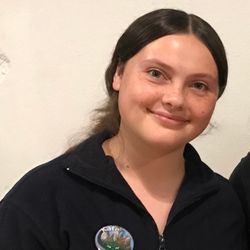
In 2019 Auckland Council Sustainable Schools Team identified that there was a need for a programme that would empower Auckland’s rangatahi to actively practise kaitiakitanga and champion action for the environment now and for future generations. As a consequence, the Young Leaders Sustainability Programme was developed. Sustainable Schools, in partnership with local mana whenua, developed a three-year leadership programme that focuses on supporting youth to take action for the Manukau Harbour. Young leaders Kate and David will explore how the programme has engaged over 120 rangatahi in developing leadership skills and action competence informed by a Māori perspective to enable them to initiate authentic action projects to improve the health of the Manukau Harbour.
Kia ora my name is Kate Laughter. I am a Year 12 student attending Marcellin College. I joined the Auckland Young Leaders Sustainability Programme in 2021 and have also completed it this year. Since completing the programme I have joined the Puketāpapa Youth Foundation, Spoken Word (WORD - The Front Line), Young Vinnies and alongside David Vailala and Georgia Hay I co-founded the cultural justice group 'Don't Forget Your Roots'.
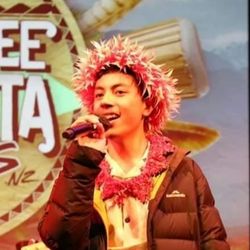
Malo e lelei my name is David Vailala. I am currently enrolled at Otahuhu College as a year 12 student. I first entered the Auckland Young Leaders Sustainability Programme as a year 11 student in 2021 and have since then also been a part of the programme this year. I am currently in the school's boy band, I have been in our school's debating team, I have been involved with running and hosting special weeks (Tongan Language week, Cook Island Language week and Math week) and I am a prefect.
Find out more about the Young Leaders programme here.

Levers of Change: Embedding Localised, Place-Responsive Experiences in Schools
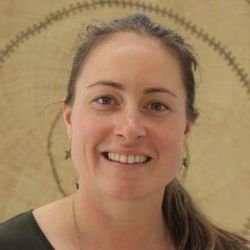
Sophie is a passionate advocate of outdoor learning and the ways it can enrich all aspects of ākonga wellbeing and development. She has held numerous educational roles, including as a secondary school teacher for over a decade. Sophie currently works as a researcher at the New Zealand Council for Educational Research (NZCER), and as a professional learning facilitator and resource developer for Education Outdoors New Zealand (EONZ).
Sophie will explore how school leaders can cultivate and support a localised and place-responsive approach to EOTC (education outside the classroom), drawing upon practice stories and research to highlight effective approaches leaders can use to maximise the levers of change.

Related content and viewing:
Watch this EONZ Revisioning School Camps webinar: Case study schools share their journey.
Read Inviting innovation: Leading meaningful change in schools by Mark Osborne (2014), published in Set: Research Information for Teachers, (2), 3–8.
Find out about PLD opportunities offered by EONZ using these links:
Revisioning School Camps
DIY Camping
Research: Achieving Predator Free 2050 - Addressing Challenges for Society and Education
Predator Free 2050 aims to eradicate all possums, rats, and mustelids from Aotearoa, on the grounds that these and other introduced mammals cause considerable harm to native forests and wildlife. This research seeks to understand diverse ethical positions on how and why to teach about this sensitive subject. Drawing on interviews with educators, animal welfare advocates, curriculum designers, and Māori stakeholders, we argue that many concerns are already being actively addressed, with emphasis often placed on the importance of humane killing, and the need for respect of all life forms.
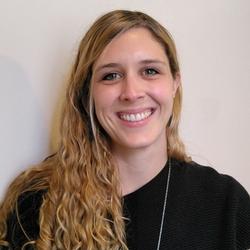
Ally Palmer is a postdoctoral researcher in Biology and Social Sciences at the University of Auckland. An anthropologist by training, her work is interdisciplinary and examines social and ethical issues in human-animal relationships, especially in conservation. Her current work explores social and ethical challenges for Aotearoa New Zealand’s Predator Free 2050, including how to teach about non-native predator control in schools.

Sally Birdsall teaches science and sustainability education courses in undergraduate and postgraduate teacher education programmes at the University of Auckland. Her research focuses on ways in which teachers and students learn about contentious issues, come to appreciate differing viewpoints, develop emotional resilience, and take informed action both individually and collectively. Sally’s current research is in contexts of declining biodiversity and climate emergency.

Signs of the Sea: Activating Conversations to Protect our Coastal Ecosystems

Sally Carson, Director of the NZ Marine Studies Centre, is an environmental educator and marine scientist with considerable experience leading educational initiatives where school students and the wider community engage with the marine environment, develop science skills and learn how to be kaitiaki for the coast. She has been the driver behind a number of community education initiatives including the Aquavan, and Marine Metre Squared, a national citizen science project on long term monitoring of the NZ seashore.
Signs of the Sea, a new resource, uses activations (simple activities that build environmental awareness) to hone people’s observation skills, their awareness of their natural heritage, and opportunities for kaitiakitanga. Learn more about how and why this resource was developed and how schools, families and communities can use it effectively.
The recording for Sally's presentation is not available for viewing at the moment, but you can find out more about her work here.
Transitions from Early Childhood to Primary: Community Connectedness
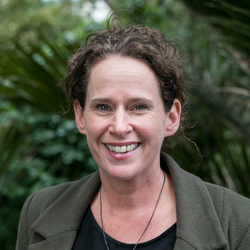
Transition from Early Childhood Education (ECE) to primary school settings is a wonderful time to reinforce the connectedness of our communities. We can build and maintain collaborative approaches with learning communities that support the empowerment of all learners and build capabilities to be changemakers.
In this session Katie Higgins (Toimata Foundation, Enviroschools National Team) and Kylee Hanlon - Judd (Auckland Council, Sustainable Schools Advisor) will share aspects of a resource developed to support the transition space (From ECE to Primary) utilising the Enviroschools kaupapa. This will include ideas, provocations and also the connections between the curriculums. They will also share of examples from ECE centres and schools, who have successful transition relationships through meaningful joint action in their communities.
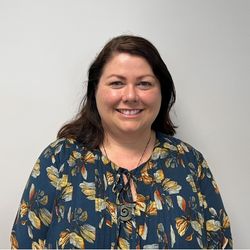

Research: Shifting Perceptions of Belonging and Heritage in Aotearoa New Zealand
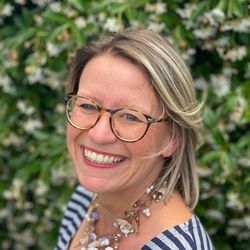
Emma is an environmental sociologist, who has lived and worked in NZ for 20 years. As a Rural Chartered Surveyor, Emma advised farmers on conservation management practices before working for the UK Countryside Agency National Park Designation Team, developing heritage and recreation policies for protected landscapes. More recently she was EIT's Environment and Sustainability Manager responsible for establishing the Ōtātara Outdoor Learning Centre, an immersive outdoor classroom which promotes nature literacy across the education curriculum. She is currently a PhD researcher with interests in place attachment, heritage and environmental storytelling.
Where are your roots and in what ways do you connect to your local environment in 21st Century Aotearoa New Zealand? Emma will present some key findings from her recent Masters in Environment and Society research, which explored the experience of place and connection for staff at EIT Hawke’s Bay. She will also share case studies of how a new framing of culture, heritage and the environment can support our sense of belonging.

Some links referred to in the Q & A session at the end:
RNZ podcast Nau Mai Town
Some of our conference contributors were not able to speak live on October 12th, but you can read more about their work or watch their pre-recorded presentations in this section.
Invoking the Sustainable Futures through Education
University of Waikato doctoral students Ria Bright, Thomas Everth, Chris Morey and Thea DePetris have collaborated to record a summary of their research, with an overview provided by Associate Professor Chris Eames. Topics covered include:
Ria Bright: Youth voices are demanding change
Thomas Everth: Climate activist teachers and lines of exploration
Chris Morey: Towards a sustainable wellbeing metacurriculum
Thea DePetris: Integrating nature-based opportunities through practitioner support
Watch the presentation here (48 mins)
Identity and Connection to Place: Indian Migrant teachers in Aotearoa NZ early childhood education
Devika's doctoral study explores the ways in which migrant Indian teachers’ cultural orientations and environmental identities influence their environmental philosophy and teaching practice in the context of Aotearoa New Zealand early childhood education. This research may be of interest to early childhood education professionals, initial teacher education providers as well as early learning service providers.
Read the research summary here



ONLINE REGISTRATION NOW CLOSED. Members of NZAEE receive a discounted rate. This registration price is for the national Online Day only and registrations close on October 7th.
ONLINE REGISTRATION NOW CLOSED. If you are not currently a member of NZAEE, you can choose to become a member for the discounted rate above, or choose this option to attend only the Online Day. Registration for the Online Day closes on October 7th.
ONLINE REGISTRATION NOW CLOSED. If you are currently a student or unwaged we would like to offer you a discounted rate so you can attend the online day on October 12th. Online Day registration closes on October 7th.
LOCAL DAY REGISTRATION NOW CLOSED. Members of NZAEE receive a discounted rate. This registration is for both a Local Day and the national Online Day on October 12th. Local day includes catering. Being a member of NZEI Te Riu Roa entitles you to this rate. Registration closes on September 30th.
LOCAL DAY REGISTRATION NOW CLOSED. If you're not a current member of NZAEE you can either sign up before you register, or choose this option which includes registration for both a Local Day and national Online Day on October 12th. Registration for Local Days closes on September 30th.
LOCAL DAY REGISTRATION NOW CLOSED. If you are currently a student or unwaged we would like to offer you a discounted rate so you can attend both days of the conference. Registration closes on September 30th.
REGISTRATION NOW CLOSED. This registration rate is for those attending a Local Connection Day only, and will not give you access to the online day (live or recordings). This is a set rate for all delegates, including NZAEE members, students, unwaged and non-members, to cover catering costs for the day. Local Day registrations close on September 30th.
